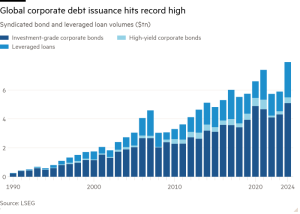Joe Biden rushes to issue cleantech loans in bid to secure legacy

Joe Biden’s administration is rushing to award billions in loans to cleantech companies in a bid to secure the US president’s green legacy before Donald Trump’s inauguration next month.
The Department of Energy’s financing arm, the Loan Programs Office, has committed more than $38bn — half of all awards issued during Biden’s presidency — since the November 5 election.
Five of the new loan commitments are among the largest awards in the history of the programme, including a $15bn loan to utility Pacific Gas & Electric for infrastructure investments, the largest on record, a $7.54bn loan to Samsung and Stellantis’s battery plant in Indiana, a $6.57bn loan to electric vehicle start-up Rivian for a factory in Georgia and a $4.9bn loan to renewables giant Invenergy to build a transmission line.
The acceleration of awards to clean energy companies comes amid concern within the industry that the incoming Republican administration plans to dramatically scale back or abolish the programme. About $43bn in conditional loans already committed by the LPO could also be at risk, according to lawyers and energy analysts.
Vivek Ramaswamy, co-chair of Trump’s so-called Department of Government Efficiency with Elon Musk, slammed the recent loan awards on X earlier this month, accusing the Biden administration of a “midnight spending spree”.
“DOGE will carefully scrutinise every one of these questionable 11th-hour transactions,” he wrote.
The loan programme, a central pillar of Biden’s industrial strategy, has been a frequent target of attacks by Republicans, who argue it is biased against fossil fuel projects, has failed to properly scrutinise loan applications and wastes taxpayer money.
“It’s a pretty good expectation that the LPO will be on the target list,” said Kevin Book, co-founder of research group ClearView Energy Partners. “That gives the outgoing administration an incentive to try to lock in as many loan guarantees and funding actions as they can.”
The threat to the office, which has $400bn available for loans, has already caused some companies to reconsider loan requests. Last month Duke Energy wrote a letter to the North Carolina utilities commission, saying it was in “the best interest” of its customers to “pause any future efforts and expenditures” on trying to secure an LPO loan until February in order “to gain clarity” on the administration’s treatment of the programme.
Formed in 2005, the LPO has served as a low-cost public financing alternative for nascent energy technologies, which struggle to get the backing of Wall Street. The office, which counts Musk’s Tesla among its successes, was hit hard by the 2011 collapse of Solyndra, a solar panel manufacturer backed by a $535mn LPO loan, triggering decade-long attacks and investigations by Republicans.
US energy secretary Jennifer Granholm called the attacks from Ramaswamy a “shame” and said the recent award announcements “have been in the queue a long time and have gone through serious vetting”.
“We are not worried at all about some sort of softer success with those that are coming through the pipeline,” Granholm told the Financial Times. Companies have repaid the programme $14.3bn and made interest payments of $4.9bn, according to the LPO’s most recent annual report. Estimated losses total $1bn, about 3 per cent of total disbursed funds.
A spokesperson for the DOE said that the pace of the loan office “has always been driven by borrowers” and that “processes and procedures have not changed”.
Some lawyers have warned the incoming Trump administration could seek to cancel conditional commitments and unspent funds made by the LPO as it races to save cash. This could put additional financial strain on companies in the clean energy sector, which are already struggling due to higher interest rates, steep competition from China and concerns over the future of the Inflation Reduction Act, Biden’s signature climate law, they said.
“There is room for judgment there,” said Mary Anne Sullivan, a former DOE lawyer under president Bill Clinton and now senior counsel at law firm Hogan Lovells. “If they really didn’t like a project, they might well find legitimate grounds for concluding a condition proceeding has not been met.”
Of the LPO’s $108bn portfolio, approximately $43bn are in conditional commitments. According to its November update, the office has 212 active applications for funding, totalling $324.3bn in requests.
Some companies brushed off concerns about Trump, citing the high volume of clean energy dollars headed to Republican-led states and escalating tensions between the US and China, the dominant cleantech producer. More than half of the projects that received loan awards under the Biden administration were located in Republican-governed states.
Under the first Trump administration, the LPO announced and finalised one loan, a $3.7bn expansion of a previous commitment to Vogtle, a nuclear plant in Georgia.
“For God’s sake, it’s a loan. It is not a boondoggle,” said Patrick Gruber, chief executive of Gevo, a US sustainable fuel developer that received a $1.47bn conditional commitment in October. Gruber is of the expectation that “pragmatism prevails” in Trump’s second term.
Additional reporting by Jamie Smyth in New York
#Joe #Biden #rushes #issue #cleantech #loans #bid #secure #legacy





